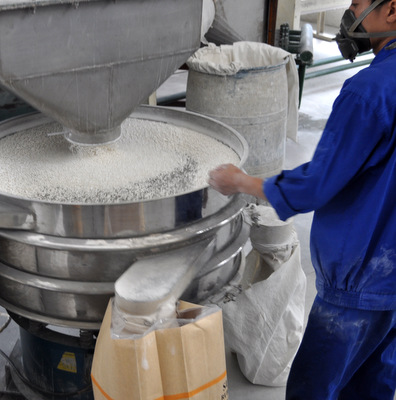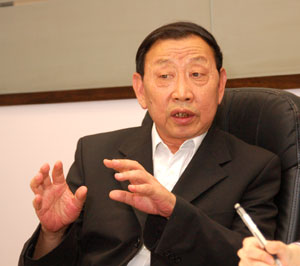 @ China Sunsine's plant in Weifang, which produces rubber accelerators. NextInsight file photo. Singapore-listed China Sunsine is the No.1 producer of rubber accelerators in China (and the world) followed by Tianjin Kemai. The latter is headed for an IPO in Shanghai, selling shares at 18 times earnings for a market cap of RMB 2,628m or (S$560m). In comparison, Sunsine's current market cap is $149m at 32c per share, or a PE of just 3X. This article gives a background on the industry, Sunsine's progress through the years and compares it with Tianjin Kemai.
@ China Sunsine's plant in Weifang, which produces rubber accelerators. NextInsight file photo. Singapore-listed China Sunsine is the No.1 producer of rubber accelerators in China (and the world) followed by Tianjin Kemai. The latter is headed for an IPO in Shanghai, selling shares at 18 times earnings for a market cap of RMB 2,628m or (S$560m). In comparison, Sunsine's current market cap is $149m at 32c per share, or a PE of just 3X. This article gives a background on the industry, Sunsine's progress through the years and compares it with Tianjin Kemai.
Background: Rubber chemicals (comprising vulcanising agents, rubber accelerators and anti-oxidants) are essential in the manufacture of rubber products.
The different types of chemicals work as follows:
» Vulcanising agents improve the physical properties of rubber. Sulfur, a common vulcanising agent, is replaced by insoluble sulfur in high-temperature applications.
» Rubber accelerators shorten the time vulcanising agents react with rubber.
» Anti-oxidants reduce the adverse effects of heat and ozone on rubber products.
| The bulk (three-fourths by one estimate) of rubber chemicals produced globally is China-made. Rising car ownership in China has resulted in heavy investments in the car and tyre manufacturing sectors, creating demand for rubber chemicals. Of the world's top companies in the three categories of rubber chemicals, two are Chinese: |
|
| China Sunsine Chemical | rubber accelerators |
| Jiangsu Sinorgchem Technology | 6PPD, high-grade anti-oxidant |
| Flexsys | insoluble sulfur |
|
(Flexsys exited the rubber accelerator sector earlier because of high manufacturing costs in Europe.) |
|
Rubber products are used in everyday life. More rubber chemicals are needed as rubber consumption is on the rise.
Production of accelerators generates waste water
Accelerators are easier to produce but the manufacturing process generates large amounts of waste water, which pollute watercourses if untreated.
In the past, local governments in China were lax on enforcement, and it was profitable to produce accelerators without incurring treatment cost. As water quality deteriorated, enforcement was stepped up and the supply of accelerators started to tighten in 2014 as some accelerator producers either suspended operations or closed down altogether.
Consolidation in rubber accelerator industry
In an interview with Tireworld, the GM of an accelerator company, 河南濮阳蔚林化工, took the view that tight pollution control requirements would benefit larger accelerator companies that have strong brands. He foresaw consolidation in the industry, and the surviving players that possess technology and capital would gain markets share.
The GM also pointed out capital alone is not enough. Proper treatment of waste water depends on experience gained over many years.
|
Kemai going for IPO to raise RMB 890m |
Sunsine's journey to become world's number one
 Xu Chengqiu, chairman of China Sunsine. NextInsight file photo.Mr Xu Cheng Chiu, founder of China Sunsine Chemical, has set his mind on production technology that does the least harm to the environment, to win orders from blue-chip tyre companies which source raw materials produced from green processes.
Xu Chengqiu, chairman of China Sunsine. NextInsight file photo.Mr Xu Cheng Chiu, founder of China Sunsine Chemical, has set his mind on production technology that does the least harm to the environment, to win orders from blue-chip tyre companies which source raw materials produced from green processes.
In 2007, Sunsine issued new shares at 39c apiece to raise RMB 260m in an IPO on SGX. Since then, its 24,000-tonne accelerator capacity has been expanded to 87,000 tonnes. Sunsine is now the world's largest accelerators producer, with 18% market share. The tyre industry, which consumes two-thirds of rubber produced, is very dependent on Sunsine.
Sunsine has been successful in growing its market share by out-pricing its competitors.
Its results announcement for the last quarter of 2011 stated that "[d]espite a slowing domestic economy, the Group had successfully increased domestic sales volume by 24% to 11,516 tons as compared to 9,317 tons in 4QFY2010 with deliberate price reductions".
The price cut was deep, from RMB 21,200 per tonne in the third quarter to RMB 19,600 in the fourth.
Average accelerator price stayed subdued, at around RMB 18,500 for 2012 and 2013, but China Sunsine’s sales volume surged to 71,700 tonnes in 2013 from 50,100 tonnes in 2011.
Stricter environmental enforcement in 2014 resulted in a supply crunch which saw average accelerator prices peak at RMB 22,800 in 3Q 14, and sales volume rise further to 76,100 tonnes. In that year, Sunsine's profit was a record RMB 220m, thrice the previous year's RMB 77m.
But in 2015, accelerator price tumbled to RMB18,900 in 1Q and RMB 18,000 in 2Q, prompting fears among investors that an oversupply is rearing its ugly head again.
However, the price slump was more likely the result of a price plunge of aniline, the main raw material. In its analysis of Sunsine 2Q results, broking firm KGI "suspect[s] Sunsine had undercut competitors’ pricing in a bid to gain an even greater market share for its products."
| Kemai's performance was comparable to Sunsine's in several respects: | ||
| 2014 | Sunsine | Kemai |
| Accelerators | ||
| Sales revenue (RMB m) | 1,615 | 1,086 |
| Sales volume (tonnes) | 76,089 | 48,732 |
| Average price (RMB/tonne) | 21,225 | 22,285 |
|
Overall |
||
| Sales revenue (RMB m) | 2,077 | 1,613 |
| Profit (RMB m) | 222 | 146 |
| Gross profit margin (%) | 27.3 | 21.9 |
| Net margin (%) | 10.7 | 9.1 |
| Shareholders' fund (RMB m) | 1,011 | 661 |
| Return on equity (%) | 22.2 | 22.1 |
Comparison between Sunsine and Kemai
Sunsine's current accelerator capacity of 87,000 tonnes (61,000 tonnes in Shanxian and 26,000 tonnes in Weifang) is much bigger than Kemai's 50,000 tonnes in Tianjin.
Its 18-hectare Weifang base has space to produce another 24,000 tonnes of accelerators. As the production infrastructure was built at the outset, installing a production line gong forward would entail minimal cost. (It cost a mere RMB 3.5m to install 4,000-tonne MBTS production line in late 2014. MBTS is a type of accelerator.)
Another example of low incremental capital cost is the RMB 9m spent on installing 8,000-tonne DCBS production in Shanxian. (DCBS, a high-grade accelerator, fetches high prices but its production generates waste water that is very difficult and costly to treat. Sunsine resumed production of it in late 2014 after finding a cost-efficient treatment method.)
And it is planning to construct a new 30,000-tonne accelerator factory in a new 16-hectare base costing RMB 97m. (Source: here)
TBBS is yet another high-grade accelerator commonly used by tyre factories. Sunsine's current TBBS capacity is 25,000 tonnes.
Unlike Kemai which has to raise funds from an IPO, Sunsine has cash, spare land and ready infrastructure. As at 30 June 2015, it had RMB 223m in cash and RMB 233m in promissory notes that can be redeemed for cash at the issuing banks.
Sunsine is therefore much ahead of Kemai in grabbing market share and lowering unit cost, while Kemai is awaiting the nod from the Shanghai Stock Exchange.







